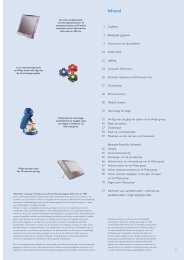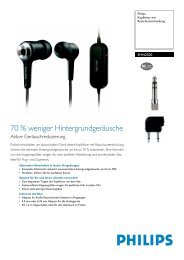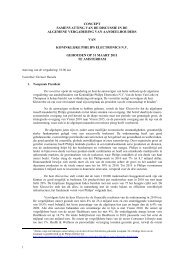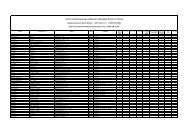Remuneration Policy
Remuneration Policy
Remuneration Policy
You also want an ePaper? Increase the reach of your titles
YUMPU automatically turns print PDFs into web optimized ePapers that Google loves.
<strong>Remuneration</strong> <strong>Policy</strong><br />
Introduction<br />
Please find below the remuneration policy applicable to the Board of Management as adopted by<br />
the 2004 General Meeting of Shareholders and lastly amended by the 2006 General Meeting of<br />
Shareholders.<br />
The remuneration policy in general<br />
The objective of the remuneration policy for members of the Board of Management is in line<br />
with that for Philips Executives throughout the Philips Group: to focus them on improving the<br />
performance of Koninklijke Philips Electronics N.V. (the ‘Company’) and enhancing the value of<br />
the Philips Group, to motivate and retain them, and to be able to attract other highly qualified<br />
executives to enter into Philips’ service, when required.<br />
In determining the remuneration policy, the <strong>Remuneration</strong> Committee ensures that a<br />
competitive remuneration package for Board-level executive talent is maintained and<br />
benchmarked with other multinational companies operating in global markets. The main focus<br />
– and the strongest weight in this benchmark – is on companies with headquarters based in<br />
Europe. Total individual compensation is aimed at the median of comparable companies in the<br />
general industry. For that purpose, benchmark research is carried out each year on a great<br />
number of Dutch companies (among others Shell, Unilever and Akzo Nobel), other European<br />
companies (e.g. Siemens, Nokia, STM and Alcatel), and over ten global multinational companies<br />
(e.g. IBM, Intel and Motorola) of comparable size, complexity and international scope in the<br />
general industry. Additional market data on hundreds of companies in the general industry is<br />
provided by a number of independent external expert advisers.<br />
Deviations on elements of this remuneration policy, when deemed necessary in the interests<br />
of the Company in extraordinary circumstances, will be disclosed in good time prior to the<br />
appointment of the individual.<br />
In order to link executive remuneration to the Company’s performance, the remuneration<br />
package includes a significant variable part in the form of an annual cash bonus incentive and a<br />
long-term incentive in the form of restricted shares and stock options
<strong>Remuneration</strong> <strong>Policy</strong><br />
Features of the remuneration for members of the Board of Management<br />
Base salary<br />
Base salaries are based on a function-related salary system and are in line with market<br />
developments shown by the benchmark research and the additional market studies. When<br />
first appointed, an individual Board member’s base salary will usually be below the maximum<br />
function-related salary. Normally (and subject to the decision by the Supervisory Board) the<br />
base salary will reach the maximum function-related salary level over a maximum 3-year period<br />
from appointment. The annual review date for the base salary is April 1. Adjustment of individual<br />
salaries by the Supervisory Board is influenced by the (annual) adjustment, if any, of the functionrelated<br />
salary levels and the progress to the (maximum) function-related salary level if this level<br />
has not yet been reached. The individual salary levels are shown in the Annual Report.<br />
Annual Incentive (bonus)<br />
Each year, a variable cash incentive (Annual Incentive) can be earned, based on factors such<br />
as the achievement of specific targets. These targets are set at a challenging level, taking into<br />
account general trends in the relevant markets, and are partly (as from 2004: 80%) linked to<br />
the financial results of the Philips Group and partly (as from 2004: 20%) to the set team targets<br />
based on the areas of responsibility monitored by the individual members of the Board of<br />
Management. The Annual Incentive criteria are 1) the financial indicators of the Company: net<br />
income with a cash flow threshold and revenue growth, and 2) team targets. For members of<br />
the Board of Management who are also the CEOs of the operating divisions, part of the financial<br />
targets will be related tp specific business objectives. The related targets for the members of the<br />
Board of Management are determined annually at the beginning of the year by the <strong>Remuneration</strong><br />
Committee on behalf of the Supervisory Board and hence are linked to the Company’s financial<br />
performance, as well as to the team targets.The financial targets, based on US GAAP financial<br />
measures, pursue value creation as the main business objective.<br />
The on-target Annual Incentive percentage is set at 60% of base salary for members of the<br />
Board of Management and 80% of the base salary for the President/CEO, and the maximum<br />
Annual Incentive achievable is 90% of the annual base salary and for the President/CEO 120%<br />
of the annual base salary. In exceptional circumstances, the <strong>Remuneration</strong> Committee may<br />
decide to increase this percentage by 20% (resulting in an Annual Incentive percentage of 108%<br />
and 144% for the President/CEO).The Annual Incentive pay-out in any year relates to the<br />
achievements of the preceding financial year versus agreed targets.<br />
Long-Term Incentive Plan (LTIP)<br />
For many years Philips has operated a long-term incentive plan, which has served to align the<br />
interests of the participating employees with the shareholders’ interests and to attract, motivate<br />
and retain participating employees. In 2003, the General Meeting of Shareholders approved the<br />
current Long-Term Incentive Plan, consisting of a mix of restricted shares and stock options,<br />
which will be continued in 2004 and beyond. This approval of the shareholders meeting included<br />
the approval of a pool of up to 12 million stock options and 4 million restricted shares based<br />
on a Philips Total Shareholder Return (TSR) multiplier – determined from year to year and<br />
explained in the 2003 shareholders meeting – of 1.1 (excluding 20% premium shares). This pool<br />
may be granted yearly to the members of the Board of Management, the other members of the<br />
Group Management Committee, Executives and other key employees. Grants can also be used<br />
for one-off situations, for example in the event of initial grants to new employees and additional<br />
grants in the event of promotion. The Supervisory Board may allocate 3% of the annual pool as<br />
2
<strong>Remuneration</strong> <strong>Policy</strong><br />
a maximum number to be granted to members and, if applicable, to future new members of the<br />
Board of Management on an annual basis. The actual number of stock options and restricted<br />
shares that will be granted to the members of the Board of Management will be determined by<br />
the Supervisory Board. This number depends on the achievement of the set team targets based<br />
on the areas of responsibility monitored by the individual members of the Board of Management<br />
and on the share performance of Philips at grant date relative to a peer group of companies, or<br />
on the circumstances of the case in the event of new members of the Board of Management or<br />
in the event of promotion.<br />
Pensions<br />
The pensions of members of the Board of Management are funded by the Stichting Philips<br />
Pensioenfonds (the ‘Philips Pension Fund’) of the Netherlands. The conditions contained in the<br />
by-laws and the regulations of the Philips Pension Fund apply. The pension plan applicable to<br />
members of the Board of Management born after January 1, 1950 is based on a combination of<br />
defined-benefits (career average) and defined-contribution and is in line with the pension plan<br />
for Philips executives in the Netherlands. The target retirement age under the plan is 62.5. The<br />
Philips executive pension plan does not require employee contributions.<br />
For members of the Board of Management born before January 1, 1950, the past final-pay<br />
pension plan is still applicable. The pensionable age – from the point of view of pension accrual<br />
– has been set at 60. If the employment agreement of members of the Board of Management<br />
continues after the age of 60, the pension payments are postponed accordingly, as provided for<br />
in the applicable Philips Pension Fund by-laws and regulations. As the retirement age is different<br />
from the date of commencement of the state pension, the pension scheme provides for a<br />
bridging payment in order to compensate for the adverse effect. The Board of Management<br />
members’ own contribution under the final-pay pension plan comprises 4% of EUR 63,024<br />
(annually set by the pension fund) and 6% of the difference between the gross pensionable salary<br />
minus a deductible part (the so-called “franchise”) and the above-mentioned amount of EUR<br />
63,024.<br />
Different arrangements resulting in additional pension benefits may apply in some cases as a<br />
result of past policies.<br />
Additional arrangements<br />
In addition to the main conditions of employment, a number of additional arrangements apply<br />
to members of the Board of Management. These additional arrangements, such as expense and<br />
relocation allowances, medical insurance, accident insurance and company car arrangements, are<br />
broadly in line with those for Philips Executives in the Netherlands. In the event of disablement,<br />
members of the Board of Management are entitled to benefits in line with those for other<br />
Philips Executives in the Netherlands. They also benefit from coverage under the Company’s<br />
Directors and Officers (D&O) policies. The Company’s policy forbids personal loans to members<br />
of the Board of Management.<br />
3
<strong>Remuneration</strong> <strong>Policy</strong><br />
Contracts of employment<br />
Members of the Board of Management have a contract of employment with the Company. The<br />
form of contract used for members of the Board of Management is in line with the standard<br />
form used for other Philips Executives. As of 1 August 2003 for newly appointed members<br />
of the Board of Management the term of the contract is, in accordance with the Articles of<br />
Association of the Company, set at 4 years, and if the Company terminates the contract of<br />
employment the maximum severance payment is in principle limited to one year of base salary in<br />
line with the Dutch Corporate Governance Code. The main elements of the contract of a newly<br />
appointed member of the Board of Management shall be made public no later than at the time<br />
of issuance of the notice convening the General Meeting of Shareholders in which a proposal for<br />
appointment of a member of the Board of Management is placed on the agenda.<br />
4
















